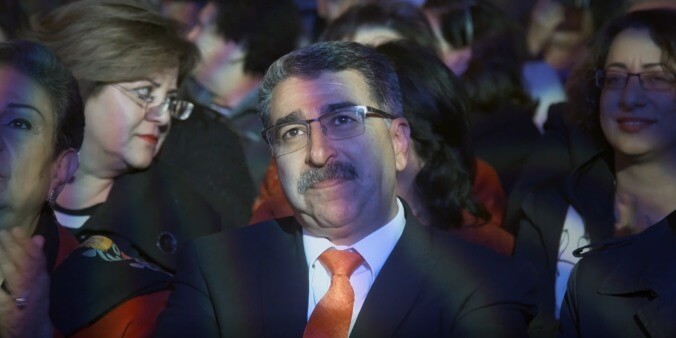Mayor finds cringe comedy and dread in the business of running a Palestinian city

Musa Hadid, the mayor of the Palestinian city of Ramallah (pop. 40,000), is not an imposing guy. Accoutered in a business suit and caterpillar mustache, the middle-aged former engineer spends the early scenes of David Osit’s documentary Mayor in visits and meetings, variously dealing with the sitcom absurdities of running a community that, at least in theory, resembles any number of affluent suburbs around the globe. First on the agenda is the city’s new slogan, “WeRamallah.” (It’s supposed to be pronounced, “We are Ramallah,” a fact that mystifies everyone, including Hadid.) Second are the pre-Christmas festivities, which feature a couple of abseiling Santas who descend with flags to a dance remix of “Jingle Bells.”
This bit of tacky, exported Americana may qualify as foreshadowing. Before long, a certain American president has declared his plan to officially recognize Jerusalem as the capital of Israel, throwing the Palestinian interim government (which also considers the city to be its capital) for a loop. Unobtrusively, Osit’s vérité camera captures the scene as Hadid learns the news from a local priest, reacting in disbelief. The exasperated mayor scrambles his secretary to get a satellite dish installed in city hall—or, barring that, to at least bring him a newspaper.
To an extent, Mayor is a film about the impact of distant geopolitics on the everyday. In Ramallah, a historically Orthodox Christian community located just six miles outside of Jerusalem, Hadid is a leader. But on a global scale, he’s a nobody; following that logic, his constituents are presumably sub-nobodies to the foreign politicians whose grandstanding affects their lives. With an eye for irony, Osit shows the mayor taking a selfie in front of the White House while on a trip to Washington, D.C., to speak at a fundraiser. Back home, the business of the city goes on: naming the new public fountain, shaking hands at Easter celebrations.
Hadid is not an overpowering personality, and the brief glimpses Osit offers of his life outside the job suggest that there’s little to reveal: He enjoys playing keyboards and has grown children who chide him about his inability to quit smoking. Yet one can’t characterize him as an apolitical, number-crunching civil servant. When a little boy asks him whether he’s with Fatah or Hamas (the two main parties of Palestinian politics), the mayor answers that he’s a member of the militant, left-wing Popular Front For The Liberation Of Palestine. “They don’t exist anymore!” giggles the boy. To which Hadid responds with a quick, self-effacing “That’s right!”
While the administration of Ramallah doesn’t suggest a continued commitment to revolutionary communism, it’s hard to deny that providing basic municipal necessities to the city—which is surrounded by Israeli settlements and frequently intruded by fresh-faced, heavily armed Israeli soldiers—constitutes some kind of political perseverance. Trash is becoming a serious problem and sewage is overflowing into the streets. As Hadid explains to a visiting German delegation, the Israeli government won’t let the city build a landfill or a sewer treatment plant. At the same time, the settlers on the hillside keep dumping waste that’s polluting the local irrigation.
The metaphor is obvious, and if Mayor succeeds at conveying some of the awkward cringe comedy of running a community under occupation, it also captures the dread. After more than an hour of modest documentary observation, the film suddenly becomes a thriller, with Osit, Hadid, and others holed up in the mayor’s office as Israeli soldiers occupy the city center. There are gunshots and gas, phone calls to journalists. Then, just like that, the soldiers retreat, and city workers come in to clean up the debris. As Hadid tells a group of graduate students at the beginning of the movie, with a degree of professional pride, “We can all decide that we don’t want the government… But I’ve never heard of someone calling for the shutdown of a municipality.” Still, as Osit’s footage evinces, there’s no such thing as local politics.